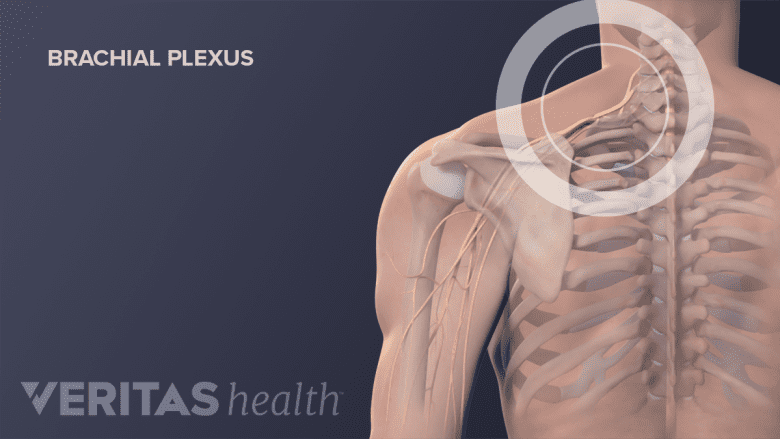A stinger is the term used to describe symptoms from a certain type of impact injury to the neck. It is a common injury in football, rugby, and other contact sports that involve impact to the head and neck.
A stinger most commonly occurs when the head is forced sideways and away from the shoulder or pushed backward. It can also be caused by a downward force to the shoulder. This sudden force pinches—or acutely stretches—the nerves in the neck. When the nerves are suddenly impacted like this, stinging or burning and possibly neurological symptoms may radiate along the path of the nerve into the arm.

A stinger injury occurs due to trauma to the brachial plexus nerves.
In This Article:
- Stinger Injuries: What You Should Know
- Common Causes of Stinger Injuries
- Injuries That Commonly Occur with a Stinger
- Treatment for Stingers
What Is a Stinger?
Stingers get their name from the intense, electric-like pain that characterizes the injury. Symptoms also include sensations of tingling and/or weakness in the arm and hand. Typically, the pain lasts 10 seconds or less, but sometimes continues for hours or even days.
The pain is triggered when the impact stretches or presses on the group of nerves called the brachial plexus. These nerves start in back of the neck and travel down into the arm and hand. After the initial electrical discharge at the time of impact, the nerves' motor fibers that allow movement in the arm often do not function well. The dysfunction is evident by weakness in the arm and possibly the hand.
A burner, or a brachial plexus injury, are other common terms for a stinger and they refer to the same injury.
Stinger Symptoms: Nerves Feel the Impact
The extent and persistence of symptoms varies considerably and depends on a number of factors, including the type and force of the impact, prior injury to the area, and the individual's anatomy.
Typical stinger symptoms include one or a combination of the following:
- Athletes often describe a stinger as a burning pain or feeling like an electric shock shooting down the arm
- The pain usually lasts only a few seconds or minutes (though it can continue for longer)
- Sometimes a player’s arm will look limp after the injury, or the player will shake the arm to get rid of the lightning-bolt sensation
- Arm and hand weakness will usually present as difficulty lifting the arm away from the body, difficulty bending the elbow, and a weak grip
- The weakness and numbness is usually brief, but can last weeks, months, or years as the brachial plexus nerve complex gradually heals
- The individual may also experience warmth in the injured area, numbness, or a pins-and-needles tingling sensation
- After the initial injury, neck pain and muscle spasms, or cramps, may develop
- Typically, a stinger only affects just one arm at a time
Rarely, especially in cases where there has been repeated injury to the brachial plexus, the stinger may result in permanent damage, such as some degree of chronic weakness.

